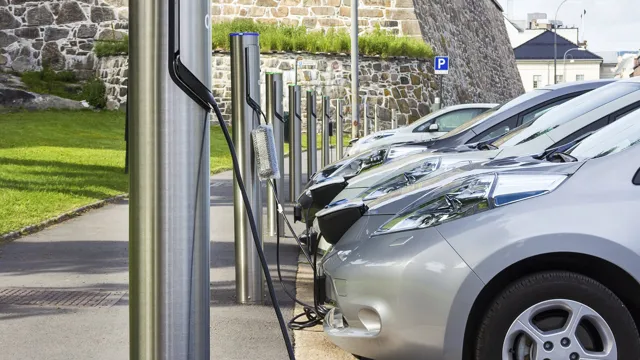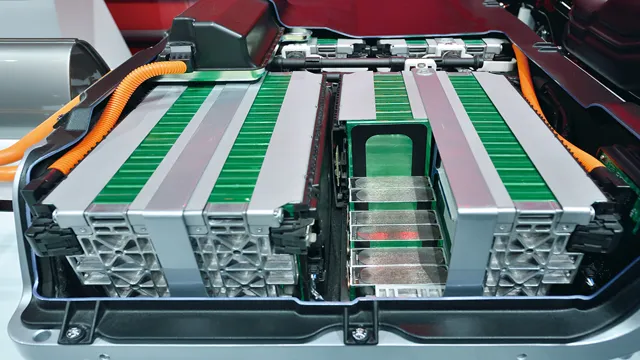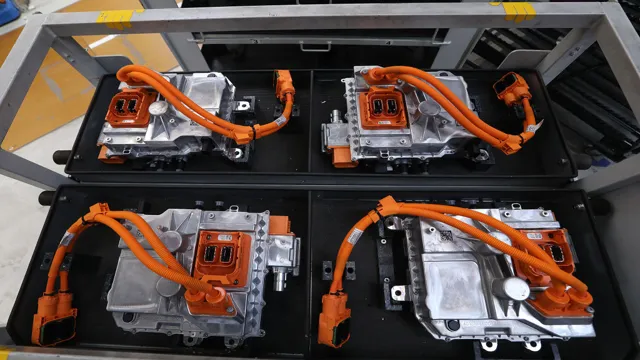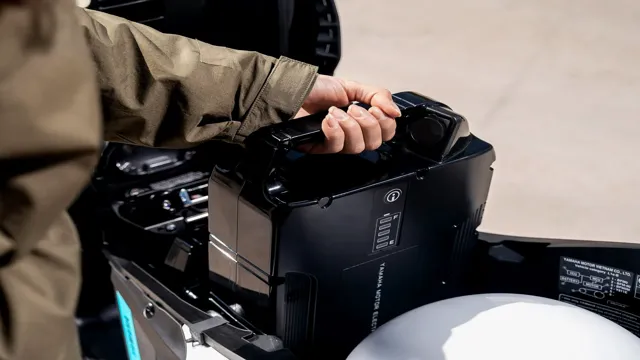The Shocking Truth on Electric Car Battery Dumping: What You Need to Know
As the world continues to look for ways to reduce its carbon footprint, electric cars have become an increasingly popular solution. However, while the environmental benefits of these vehicles are clear, there is a dark side to their production that often goes unnoticed. Specifically, the process of mining and disposing of materials used in their batteries can have a significant impact on both the environment and human health.
In fact, recent studies have shown that the dumping of electric car batteries can lead to costly consequences that far outweigh any benefits of their use. So, what exactly are these consequences? And what can we do to ensure that electric cars remain a viable solution for the future? Let’s explore.
What is Electric Car Battery Dumping?
Electric car battery dumping is a term used to describe the practice of disposing of old or defective electric car batteries in developing countries. This practice is harmful to the environment, as the batteries often contain toxic chemicals that can leak into the soil and water supply, causing harm to people and wildlife. It is also economically damaging to the countries that receive these dumped batteries.
Most developing countries lack the infrastructure and resources to dispose of these batteries safely, leading to environmental and health hazards. As more and more electric cars are produced, the problem of battery dumping is becoming increasingly problematic. To combat this issue, it is necessary for manufacturers to take responsibility for the safe disposal of their batteries and for governments to regulate the industry to ensure that dumping is prohibited.
By working together, we can protect the environment and ensure that people around the world are not adversely affected by the growing electric car industry.
Explaining the Problem
Electric car battery dumping is an environmental and ethical issue that arises when developed countries (either individual companies or the country as a whole) export their old or discarded electric car batteries to developing nations. This is done in an attempt to reduce the cost of disposing of these batteries, which is often quite expensive. While this may be financially beneficial for these developed nations, it has a significant negative impact on the developing nations that receive these batteries.
These batteries can contain toxic chemicals and heavy metals that can harm both workers and the local environment. Additionally, the batteries often have a limited lifespan and need to be disposed of soon after they arrive, further contributing to environmental pollution and potential health hazards. Overall, the practice of electric car battery dumping highlights the need for sustainable and responsible waste management practices, particularly as the use of electric cars becomes increasingly prevalent.

Negative Environmental Impact
Electric car battery dumping refers to the improper disposal of electric vehicle batteries after they have reached the end of their useful life. This practice is a serious threat to the environment because these batteries contain toxic chemicals that can leach out and contaminate soil and water sources. Improper disposal of these batteries can lead to serious health problems and environmental degradation.
When dumped in landfills, they can release toxic substances into the air, water, and soil, polluting the environment. To prevent this from happening, it is crucial to properly recycle EV batteries through certified recycling facilities. This breaks down the battery components into safe materials, which can be reused in new battery production or other products.
By doing so, we can minimize the negative impact of electric car batteries on the environment, and preserve our planet for future generations.
The Economic Impact
The economic impact of electric car battery dumping cannot be underestimated. When these batteries end up in landfills, they release toxic chemicals that can harm the environment and human health. Additionally, the disposal of these batteries can be expensive and time-consuming, leading to higher costs for both businesses and consumers.
However, there is also an economic opportunity to be gained by recycling these batteries. The materials used in electric car batteries, such as lithium and cobalt, are in high demand for other industries. Recycling these batteries not only reduces waste but also creates a sustainable supply of valuable resources.
Ultimately, policymakers and businesses must work together to find a solution that balances both the economic and environmental impact of electric car battery disposal. By doing so, we can create a circular economy that benefits both the planet and our wallets.
Rising Costs of Lithium-ion Batteries
Lithium-ion batteries are vital components of modern technological advancements, from smartphones and laptops to electric vehicles and renewable energy storage systems. However, the rising costs of lithium-ion batteries are a growing concern for manufacturers and consumers alike. The economic impact of these rising costs can be felt across several industries, with the automotive and renewable energy sectors being hit particularly hard.
As a result, the prices of electric vehicles and renewable energy storage systems have seen a significant increase in recent years, making it more challenging for the average person to purchase and benefit from these technologies. Despite the increasing demand for lithium-ion batteries, the key raw materials needed to produce them have been in short supply, further driving up the prices. While the market continues to adapt, it remains essential to actively seek out new ways to source and produce materials that are necessary for the production of lithium-ion batteries, ensuring continued technological advancements without sacrificing affordability and accessibility for all.
Potential for Profitable Recycling Solutions
When it comes to recycling, there is no denying the economic impact of such initiatives. More and more people are now realizing the potential for profitable recycling solutions, and this has created a thriving market. The recycling industry is not only helping in reducing environmental pollution but also contributing to the economy by creating numerous job opportunities.
Moreover, the process of recycling materials saves huge amounts of energy and therefore helps in minimizing the depletion of natural resources. The market for recyclable materials is continuously expanding, which means that there is an enormous potential for companies to tap into this market and turn a profit. By investing in innovative recycling technologies and creating a circular economy, it is possible to maximize the value of waste and reduce the negative impact on the environment.
All in all, there are many economic benefits to recycling, and it is not only good for the planet but also for businesses that are looking to do their part in creating a sustainable future.
Job Creation in the Recycling Industry
Recycling industries are great contributors to job creation, which has a positive economic impact. This is because the recycling industry encompasses various fields such as collection, transportation, sorting, and processing of recyclable materials. Each of these fields requires different skill sets and involves work opportunities for numerous individuals, including entry-level, semi-skilled, and highly skilled workers.
In addition, the work involved in the recycling industry is not easily automated, making it an excellent source of job creation for people in search of employment. According to a report by the Institute for Local Self-Reliance, the recycling industry has over 1 million wage and salary jobs in the United States alone.
Therefore, cities, counties and states must continue to encourage their citizens to recycle as it creates job opportunities, helps to mitigate climate change, and protects our environment.
What Can We Do?
As the demand for electric cars increases, so does the issue of electric car battery dumping. These batteries contain harmful chemicals and metals like lead, lithium, and cadmium that can have devastating effects on the environment if not disposed of properly. So, what can we do? One solution would be to encourage the recycling of electric car batteries.
The materials used to make these batteries are expensive and valuable, so recycling them not only helps save the environment but also reduces costs for manufacturers. Additionally, using renewable energy sources to charge these batteries can further reduce the environmental impact of electric cars. As consumers, we can also make a difference by properly disposing of our electric car batteries and encouraging others to do the same.
Let’s take action now to prevent electric car battery dumping and create a more sustainable future.
Encouraging Responsible Battery Disposal
As our dependence on batteries for powering our gadgets and devices grows, so does our responsibility for responsible battery disposal. One thing we can do is to start by avoiding throwing batteries in the trash, where they usually end up in landfills and contribute towards environmental pollution. Instead, we can drop them off at designated collection points, such as local recycling centers, electronics stores, and some supermarkets.
It’s crucial to ensure that the batteries we dispose of are properly recycled and not left to leak harmful chemicals into the environment. In addition, we can adopt the use of rechargeable batteries, which not only reduces the batteries that need disposal but also saves us money in the long run. By taking these simple actions, we can play our part in encouraging responsible battery disposal and help protect our planet from harmful pollution.
Promoting Battery Recycling and Second Life Applications
As awareness around the impact of battery waste grows, it’s important to consider ways to minimize our environmental impact when it comes to disposing of batteries. One of the most effective ways to do this is by recycling batteries. By doing so, we can recover valuable metals and components that can be reused in new batteries or other products.
This helps to reduce the need for new materials and ensures that less waste ends up in landfills. Additionally, there are second life applications for batteries that are no longer capable of powering devices. These applications can include using them as backup power sources for home appliances or pairing them with solar panels to store energy.
Overall, promoting battery recycling and second life applications is an important step in reducing our carbon footprint and ensuring a sustainable future.
Conclusion
In the game of environmental responsibility, we can’t afford to dump our electric car batteries. Let’s recharge our sense of sustainability and recycle these batteries to power a brighter, cleaner future.”
FAQs
What is electric car battery dumping?
Electric car battery dumping is the process of disposing of used electric vehicle batteries in such a way that they harm the environment.
Is electric car battery dumping common?
Yes, electric car battery dumping is becoming increasingly common as the number of electric vehicles on the road increases.
What are the environmental impacts of electric car battery dumping?
Electric car battery dumping can lead to soil contamination, water pollution, and damage to wildlife and ecosystems.
What can be done to prevent electric car battery dumping?
To prevent electric car battery dumping, it is important to promote battery recycling and establish proper disposal processes. Governments and manufacturers should also work together to develop sustainable and responsible battery production and end-of-life strategies.




